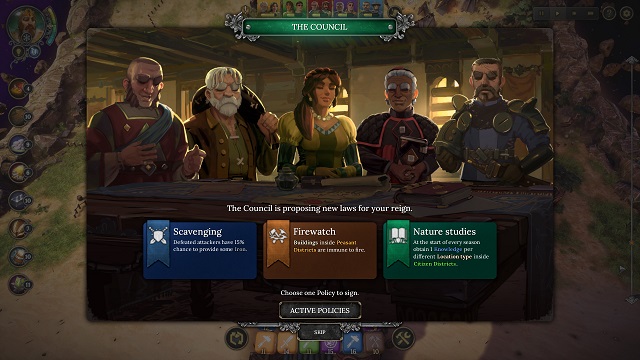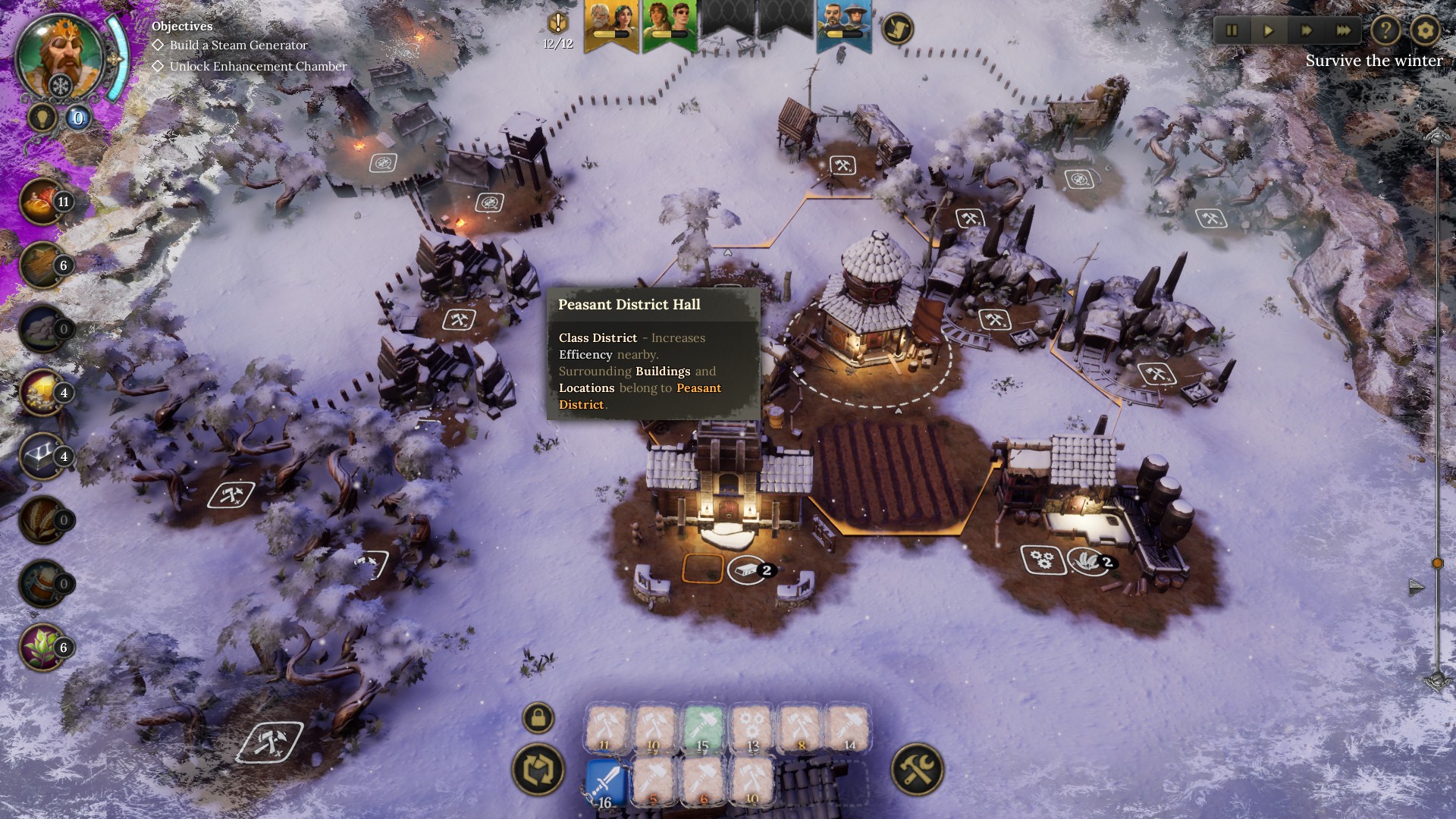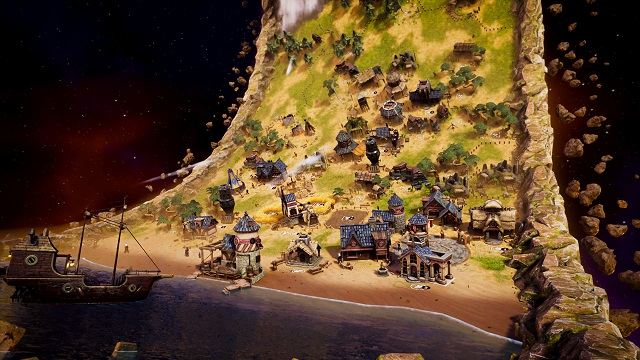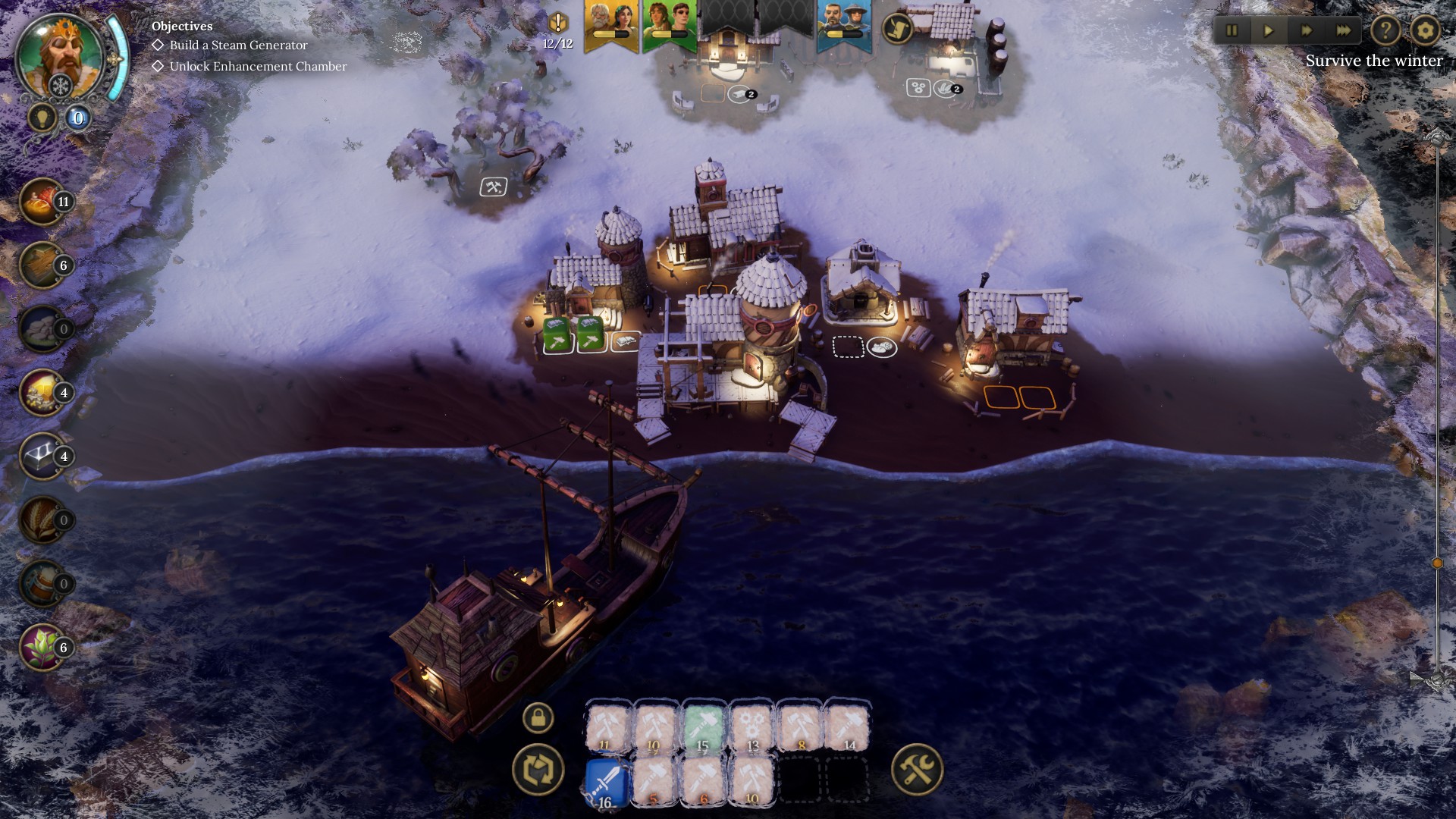Dice Legacy bills itself as a roguelike — the title, intentionally or not, evokes Rogue Legacy — where instead of hiding the random number generator behind the curtains, it turns that RNG mechanic into the main character. The dice are not only the random element that drives gameplay but also your army of peasants and soldiers fighting terrain, weather, and hostile forces on a bizarre, ring-shaped alien world.
The premise quickly falls apart once you actually start playing the game, however. Anyone with even a slight modicum of experience playing roguelikes or even games in general can quickly pick apart every narrative conceit here, seeing the game for exactly what it is — a straightforward, vertical-scrolling barebones resource management and strategy game rather than the roguelike it claims to be on the virtual box.
Dice Legacy Review — Is That It?
Your pawns are a set of six-sided dice — five at first, although that quickly grows to a maximum of 12 — which you roll in order to determine which kind of move the die can make on its turn. It could be building, gathering resources, exploring the world ahead, conducting research, engaging in battle, trading, or performing religious functions depending on the type of die rolled and the result of the roll itself.
There’s a class system in place here, too. You start the game with orange peasant dice, capable of those first three functions listed above plus combat. Build the school and you get green citizen dice, who in addition to researching can also farm and build. The military academy gets you blue soldier dice, whose prime function is combat, but they’re also capable of building.
The market nets merchant dice — their primary function converting resources into gold through trade, but they also explore and interact with “camps” on the map to turn potential enemies into trading partners and can do a bit of resource gathering as well. And finally, the temple nets priest dice whose function is that of healer and morale booster for the other dice on the board.
Later, late-game buildings can mix, match, and combine those basic types into hybrid dice, but the core functions you can roll on the faces of the dice are the limit of what those dice can ultimately do on the board.
This establishes a basic gameplay loop. Like any good RTS, you build a base, gather and use the resources provided on the map, forge ahead to find the enemy, then destroy the enemy base, a formula that’s been enshrined in gaming canon since Warcraft: Orcs and Humans codified the genre way back in 1994. Once again, as much as Dice Legacy really wants you to believe it’s a roguelike, it resembles one only superficially. Randomly generated resource locations do not a roguelike make, not on their own.
There are just a few critical flaws that prevent Dice Legacy from actually being good.
The first is that the gameplay loop is far too simple. I put about 12 hours into the game, one terminated playthrough to get to grips with how things worked followed by three playthroughs that became progressively less interesting for how easy Dice Legacy is both to pick up and, ultimately, master for anyone with a reasonable degree of experience playing RTS games. Granted, I’ve been playing them for 27 years (since the aforementioned Warcraft), but this game has even less depth than early Warcraft.
The second is this type of RNG is never really something to focus a game around. Maybe some people are into that — after all, pencil-and-paper RPGs wouldn’t be what they are without a bag full of variously shaped dice — but in general, there’s a good reason why dice rolls are usually hidden from the player’s eye.
Even in tabletop, a good game master rolls the dice but then narrates to the players what happened in an in-universe tone. Abstracted randomness tends to be less immersion-breaking than literally seeing it play out in front of your face.

The third is that the “challenges” in Dice Legacy are less roadblocks and more speed bumps. Every time you roll a die, it loses 1 HP out of 16, but it is trivially easy to heal dice, with multiple ways put in place to restore those HP. Even combat, where a die that gets wounded in combat is killed if it gets wounded again, is solved super-easily through the apothecary building the game makes available from the start.
Along those same lines, the Dice Legacy has a summer/winter seasonal cycle, and winter is supposed to be a perilous time when you can’t produce wheat (the basic food resource) and dice have a chance to freeze, taking them out of action until they thaw out in warmer weather.
The trouble is that it’s easy to unfreeze those dice using the in-game ale resource, there’s a policy you can implement to keep the farms working year-round, and generally, what’s supposed to be a challenge is just another resource sink.
And the fourth is that despite the game trying to vary up play a bit with a few unlockable extra scenarios — changing the starting dice or a couple of the game rules — it’s just a different coat of paint on the same car driving down the same road toward the same destination. You’ll get bored long before you see everything because bluntly, once you’ve seen the gameplay loop once, you’ve seen everything.
It doesn’t help that the difficulty levels are of the standard “how much do you want the computer to cheat” variety rather than the “AI gets smarter” variety, never a good sign.
Dice Legacy Review — The Bottom Line

Pros
- Stable, apparently bug-free experience
- Clever concept
- If you like rolling dice, this is the best thing outside of a Craps table
Cons
- Almost no replayability once you’ve grasped the basic concept
- Too simple to pose much of a challenge
- Building a whole game around randomization is needlessly frustrating
Dice Legacy is just too shallow and too reminiscent of other, better games. It’s just far too simplistic to have any kind of real replayability, and since your first playthrough will be done in four or five hours at most, that leaves little to play for.
Sure, the game does try to extend its replay value by offering different starting conditions and rule restrictions to try to get you to play it again, but it’s the same meta every time with no real variation. There’s no shortage of good roguelikes out there. Crack those open instead. You’ll have a lot more fun that way.
[Note: Ravenscourt provided the copy of Dice Legacy used for this review.]








Published: Sep 7, 2021 11:55 am